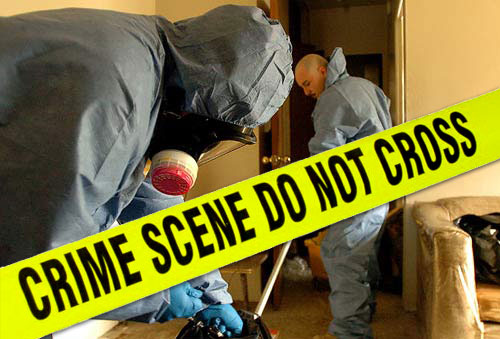For grieving relatives, the prospect of mopping up a loved one’s bodily fluids after their death is undeniably disagreeable – this is why many devastated families turn to dedicated crime scene cleaning companies to complete the job on their behalf.

If a particularly gruesome death, suicide or accident occurs on your property, aside from the obvious emotional repercussions, it’s your responsibility to arrange for any blood, semen, urine, faeces or brain matter to be expunged from the scene.
You would be forgiven for assuming the duty of arranging a crime scene clean-up is the job of the emergency services, but once the police, fire crews and paramedics have responded and completed their investigation, forensic cleaners are the ones typically employed to clear dangerous biohazards.
Unsurprisingly, this is a highly specialised field, which requires rigorous training, as there are a number of strict guidelines and legislation surrounding the effectual cleaning of crime and trauma scenes.
The treatment of contaminated areas is vital in the fight against infection, with a tangible risk to human health after a violent death. Viruses can transfer through bodily fluids, which causes a potential risk of illnesses such as hepatitis B, hepatitis C and HIV.
Discover the stomach churning truth behind forensic cleaning
Regardless of the type of premises where an offence or accident has occurred, a crime scene cleaner is on hand to sensitively remove all traces of the incident and restore the scene back to its original state.
Specialists are required to disinfect all surfaces, remove blood soaked carpeting and even collect brain matter. Typically, a forensic clean can take up to 48 hours to complete, although it does depend on the severity of the incident and the level of biohazardous material in the property.
Although the thought of ducking under the police cordon and experiencing the thrills and spills of a crime scene may offer a certain buzz, the reality commands that the specialist have an ironclad stomach and the ability to deal with shell-shocked members of the public.
In addition to compassion, the budding forensic cleaner must have a keen eye for detail, as a job that may seem simple on the surface could be masking some hidden hazards. For example, a minuscule blood stain on a carpet could be covering a much larger blemish underneath.
What’s more, a crime scene cleaning company should be in possession of the appropriate legal rights and permissions in order to handle dangerous biohazards, and ensure they only employ men and women with the unique skillset to get the job done without spending half the day throwing up.
There’s no doubt this is a challenging career for even the most battle-hardened cleaner, requiring high levels of discretion and benevolence, but the satisfaction gleaned from this rewarding vocation – and the fact you’re helping folk in their time of need – ultimately makes the gore worthwhile.
Photo: link



